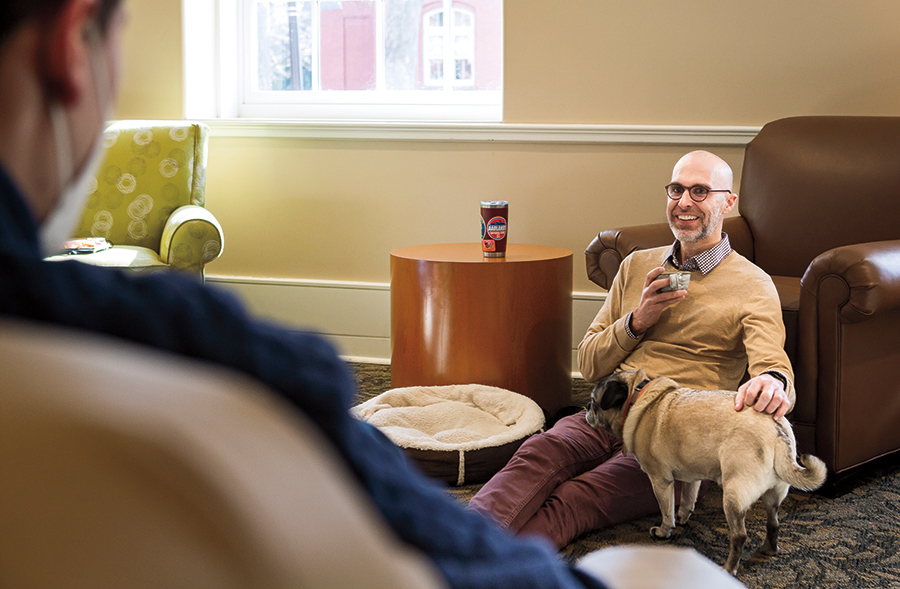Professor
in the
House
photographs by Dustin Fenstermacher
McKinney, who teaches Spanish, is Bucknell’s first professor-in-residence. Since December 2018, he and his family have lived in a two-bedroom apartment in Roberts Hall. Not all of his roughly 300 neighbors in Roberts, Trax and Kress (known as RTK) have yet realized he lives there or have come to call at 201 Roberts Hall, but McKinney has issued a standing invitation. Through weekly coffee hours, larger social events, casual conversations and just being present for residents — even during middle-of-the-night fire alarms — McKinney has developed well-rounded relationships and meaningful connections with Bucknell’s multidimensional students.
CONNECTIONS BEYOND THE CLASSROOM
As part of a $15 million renovation of Roberts Hall in 2016, the second-floor office that once housed Bucknell’s Writing Center was converted into a two-bedroom apartment. The residence was ready; it just needed a professor.
The position seemed a natural fit for McKinney. Throughout his 15 years at Bucknell, he has frequently sought opportunities beyond the classroom. “Too often, our interactions [as faculty] with students are mediated by schoolwork, exams and papers,” he says. “It’s nice to take that completely out of the equation and have interactions with students that allow me to get to know them — their goals, their anxieties and what they’re into.”
McKinney is the senior fellow in the Languages & Cultures Residential College. He has co-led four BACES (Bucknell Advancing Communities, Educating and Serving) trips to the Dominican Republic and has been faculty-in-residence during the semesterlong Bucknell en España study-abroad program in Granada, Spain. He also has co-led a summer session in Spain, hiking 160 miles of the Camino de Santiago with students.
“That experience was especially relevant,” McKinney says. “You’re hiking together every day, sleeping in pilgrim hostels on bunk beds. You’re used to being in close quarters with students.”
The timing of the professor-in-residence opening was particularly fortuitous for the McKinney family of five (six when you include Mort).
“We lived in a pretty big house, with five bedrooms, on an acre at the edge of town,” McKinney says. “We already had one child leave home, and the second was getting ready to go to college. We’d been talking for a while about downsizing and were looking at smaller places downtown, closer to campus. When the position was announced, we said, ‘Hey, let’s go for it.’ ”
THE RHYTHMS OF ROBERTS HALL
The McKinneys enjoy a four-minute commute to work: McKinney walks to Coleman Hall, and Tara walks to her two jobs at the Office of Accessibility Resources Testing Center in Academic West and the Bertrand Library Service Desk.

They also have learned to expect the unexpected. One night, at 2 a.m., they heard a tap at their second-floor window. “Some students on the fourth floor had ordered a pizza and were lowering a suitcase for the delivery guy on the ground to put the pizza in,” McKinney says. “I joke that I should have grabbed a slice as it was going up.”
Then came the ultimate unexpected: the campus closure in March 2020 due to the COVID-19 pandemic. Roberts Hall was eerily quiet and nearly empty. Among the few students who remained was Sherab Dorji ’22, who couldn’t return home to Bhutan. “Collin and Tara were so inviting,” Dorji says. “They would have me over for tea and listen to my worries and fears. They were such a comforting presence.”
MEANINGFUL INTERACTIONS
His larger-scale events have been well attended, especially the Diwali festival this past November. But his weekly coffee hour in the Roberts Hall lounge has proven to be his most popular and successful way to connect with students.
“We talk about anything and everything,” says Andrei Bucaloiu ’22, a double major in creative writing and Spanish. “We chat about how our weeks are going, if we’re trying to find research opportunities. Since he lives in our community, we can talk about all the small happenings that occur in RTK.”
McKinney will sometimes invite staff members from the global education office and career center to the coffee hour so students can talk to them casually — even in their pajamas. “That’s what I’m always thinking of when I put these events together: how to combine these two worlds, the academic world and the student-life world,” he says.
Nearly every coffee hour also features a VIP (very important pug): Mort. “I have no delusions that at coffee hour the students have come to see me,” McKinney says with a laugh. Whether it’s due to Mort or McKinney, the coffee hour boasts a robust repeat clientele. “We get students who lived in RTK last year but still come to the coffee hour,” he says. “I think that’s a testament to the degree to which we’ve gotten to know each other and that they value that experience.”
If the creation of more residence-hall apartments becomes possible, Badal would love to see the program expand. Now in the first year of his second three-year faculty-in-residence term, McKinney encourages his fellow professors to seek out future opportunities, should they materialize.
“The classroom provides us only a very small window into our students’ lives,” McKinney says. “When we see them outside the classroom, we really get to see the whole person. Those experiences are so rewarding.”